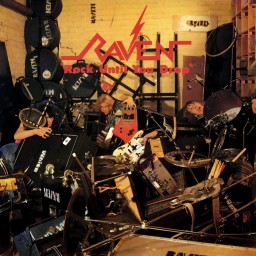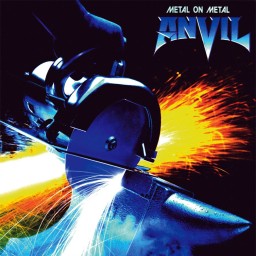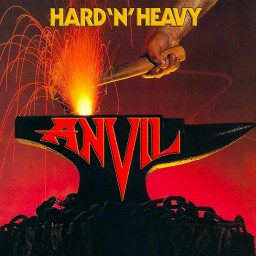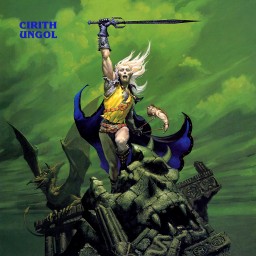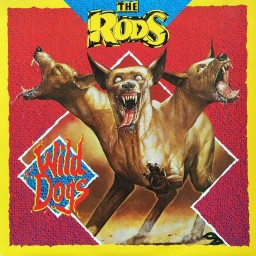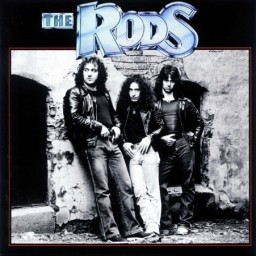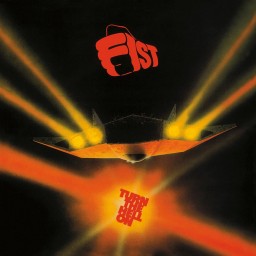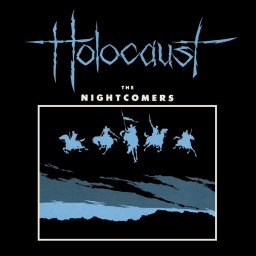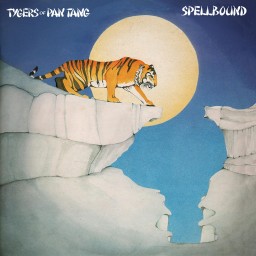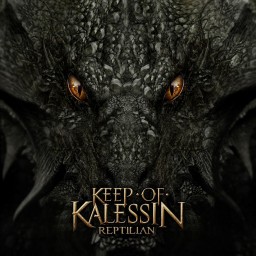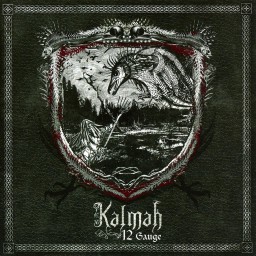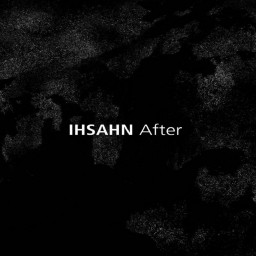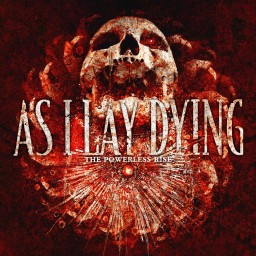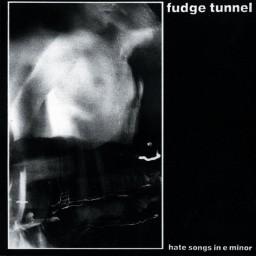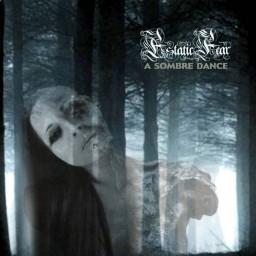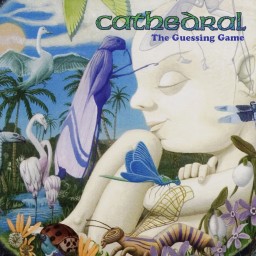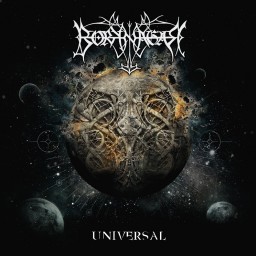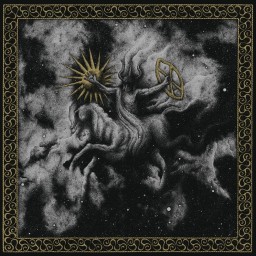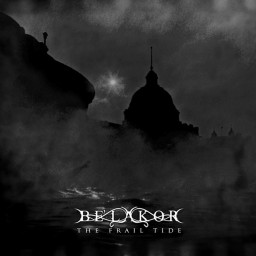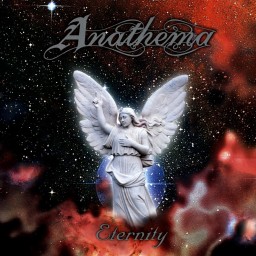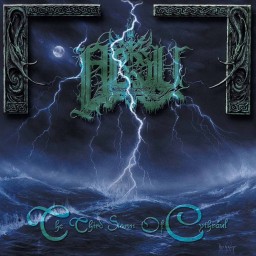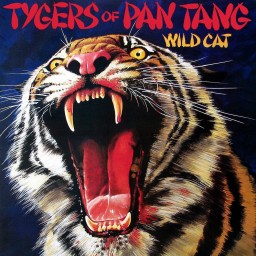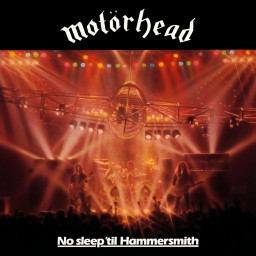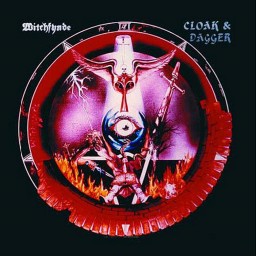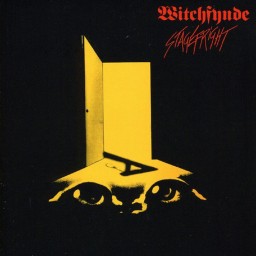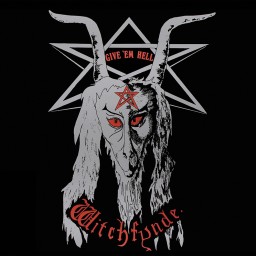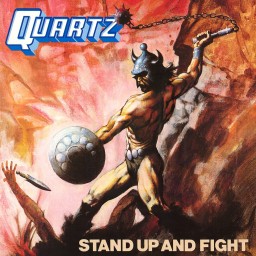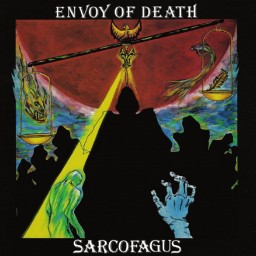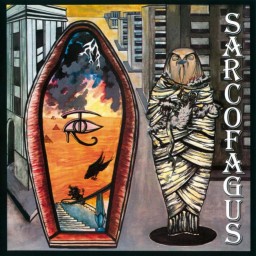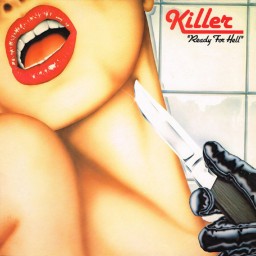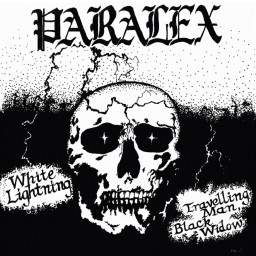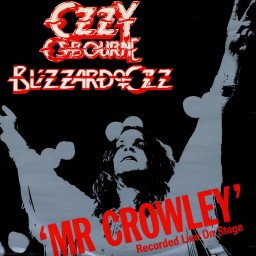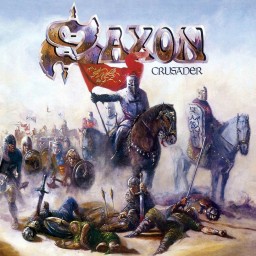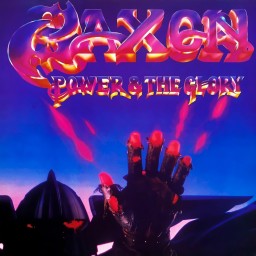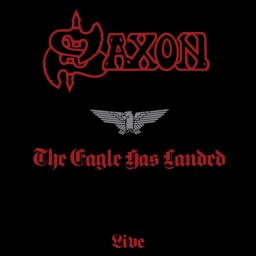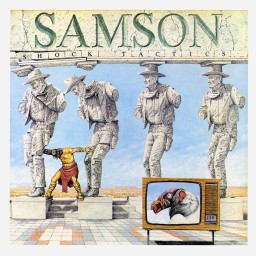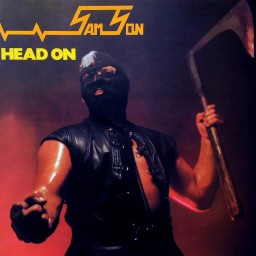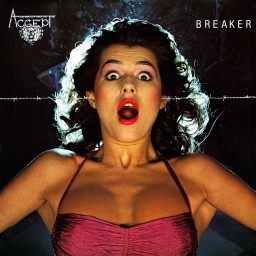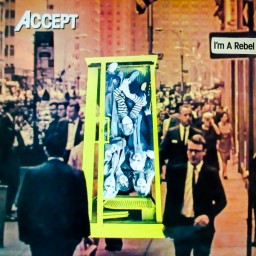Daniel's Reviews
Raven are a three-piece NWOBHM act formed by the Gallagher brothers John & Mark in 1974 in Newcastle, England but it wasn’t until 7 years later in 1981 that we finally heard the first recorded output from the band. Given that information it’s not too surprising that “Rock Until You Drop” presents a band that knows a thing or two about playing heavy music. It was in fact the very first full-length album release from legendary NWOBHM record label Neat Records who continued championing the sound for the next 15 years.
At the time Raven described their time as “athletic rock” & their gimmick of choice was to present themselves in athletic protective equipment (like ice hockey masks) which they often removed & smashed against the drum kit during live sets. Musically though, the first thing you’ll notice about “Rock Until You Drop” is the sheer velocity & the general rawness of Raven’s sound. They really don’t hold much back here & it’s hard to argue with the common opinion that this record was a major influence on thrash & speed metal. I can comfortably hear the influence on some of the rawer thrash metal bands like Kreator & Exodus. Raven were certainly going for a sound that was a long way from the more polished & accessible material that most classic heavy metal bands (like Judas Priest for example) were releasing at the time. In fact, "Rock Until You Drop" is almost the polar opposite as far as metal releases go.
The high-pitched shrieks of bassist John Gallagher were fairly over-the-top & to my ears they often fall slightly on the wrong side of being tasteful. This really is a very noisy three-piece though. They make a heck of a racket for only three dudes. It’s very easy to pick up the Judas Priest influence in their sound as well as the early Iron Maiden one however they were more extreme than either of those bands. In fact, you’ll do well to find a faster or thrashier band at the time. There’s definitely a fair whack of AC/DC style hard rock in their sound though as well with some touches of 70’s progressive rock & some unfortunate hints of more commercial US rock like Van Halen or even early glam metal.
The real let-down for me though is the inconsistent song-writing. There are a few decent songs on offer however none of them really captures me to the extent that they seem to for other metal fans. I think the overly raw production contributes to that a little bit however I find it hard to shake the feeling that the hooks & execution just aren’t quite good enough to keep me interested. “Rock Until You Drop” isn’t horrible. It’s just not really for me.
Genres: Heavy Metal
Format: Album
Year: 1981
I wasn't very impressed with the 1981 debut album from Canadian heavy metallers Anvil entitled “Hard ‘n’ Heavy”. In fact, I’d go so far as to say that it was probably the weakest metal-related release of 1981. But let’s not let that discourage us as the band was about to take some positive steps with their follow-up album “Metal On Metal” which was released a year later in April 1982.
The debut album was a self-financed & produced effort however “Metal On Metal” sees the band teaming up with producer Chris Tsangarides who would later go on to a great career working on heavy albums like Judas Priest’s “Painkiller”, Thin Lizzy’s “Thunder & Lightning” & Bruce Dickinson’s “Tattooed Millionaire” as well as a host of other more commercial ventures. And the result is a much more powerful & punchy production job. The drum sound in particular is a much better platform to showcase Robb Reiner’s skills. But that’s not the only obvious difference from Anvil’s debut as it’s amazing just how far the band have come musically in only a single year.
The cheesy commercial hard rock croonings of the debut are nowhere to be found here & we now have a genuine heavy metal sound & one that’s up there with the most intense ever released to that time. Now many people may scoff at the idea that Anvil paved the way for the thrash metal movement & never received the rewards they were due however those people should really give “Metal On Metal” a listen before making those statements because, love it or hate it, it’s hard to deny the obvious hints towards a thrashier sound here. The Judas Priest influence has increased ten fold from the last album & we often see some not so subtle tributes to the mighty Priest. Especially so in Steve “Lips” Kudlow’s vocal performance on a couple of tracks where he’s clearly trying to channel the vocal prowess of Rob Halford. And with fairly minimal success it has to be said.
The musicianship on display is top notch throughout though with Rob Reiner’s drumming being the clear highlight. I’d be surprised if he wasn’t a major influence on the early thrash metal drummers & I’ve read that this was the case for people like Metallica’s Lars Ulrich & Gene Hoglan who would go on to play for virtually every great metal band ever. The twin guitar attack is very effective with Steve contributing some great lead solo work throughout. My major concern though is still his vocals. I just don’t think that Lips is up to the task of fronting a tier one metal band. It’s not that he can’t hold a tune because he certainly can but he still sounds like a complete amateur to my ears & it’s my firm opinion that this is the thing that has held Anvil back from the sort of success that other bands could achieve with an equally strong instrumental approach. The cheesy lyrics about girls are still in full effect here too which doesn’t help. It wouldn’t be a show stopper though if the song-writing were top notch. Unfortunately though, while there are plenty of great riffs here, I can’t say that many of the songs meet the mark as a complete package. It’s proof that you can make a pretty darn heavy metal record but if the song-writing is flat then the album won’t be engaging over the long-term.
Regardless, “Metal On Metal” is still Anvil’s most popular release & the title track is the band’s undisputed anthem. Personally, I’ve never liked it. It’s not horrible but just sounds kinda dumb to my ears. There are three standout tracks on the album that I really enjoy while the rest does very little for me. The Dave Allison fronted commercial rock ballad “Stop Me” is probably the low point but there are a couple of other tracks on the B side that I genuinely hate like “Scenery” which blatantly steals one of the main riffs from Ozzy Osbourne’s “Crazy Train”. I don’t think it’s any surprise that my album highlight track is also an instrumental though with the short two & a half minute “March Of The Crabs” being quite a thrashy & impressive musical excursion with some exciting lead guitar work. “Metal On Metal” also finishes with two pretty strong numbers in “Tease Me, Please Me” (yeah metal as fuck song title I know) & the particularly intense “666”. In fact, I’d go so far as to say that “666” is a genuine thrash metal outing. Perhaps the earliest ever recorded.
So I can see why “Metal On Metal” was an important release for the maturity of thrash metal but it still doesn’t make for an enjoyable listen for me. Perhaps Anvil are just one of those bands that I’ll never understand.
Genres: Heavy Metal
Format: Album
Year: 1982
Perennially overlooked heavy metallers Anvil technically formed in Toronto, Canada in 1981 however their roots really go way back to 1973 when core members vocalist & lead guitarist Steve “Lips” Kudlow & drummer Robb Reiner met through a high school friend. It took a full five years before they got too serious though & 1978 saw them forming a four-piece band by the name of “Lips”. Three years later in 1981, Lips self-financed the recording of their debut album “Hard ‘n’ Heavy” which would go on to become the first metal release of any note to come out of Canada. Shortly after the recording of the album, Lips were picked up by Attic Records & they thankfully decided to change their name to Anvil for the Attic release of the record.
“Hard ‘n’ Heavy” clearly showcases a band that was still finding it’s sound which is a little strange when you consider just how long they had been floating around for by that stage. It’s also pretty hard to believe that these songs were the best of their entire repertoire after so many years of writing & performing. Whilst the album is unquestionably a heavy metal release, I'd suggest that around 40% of the material is closer to hard rock & during the weaker moments on the album I’d even go so far as to throw around the more unforgiving “glam metal” tag. To my ears, Anvil's early sound generally sits somewhere between Judas Priest, AC/DC & Ted Nugent.
The production isn’t too bad for a self-financed debut release. Instrumentally the band are up to the task with some pretty decent guitar solos & particularly solid drumming from Reiner. Unfortunately the song-writing is very patchy & there are a couple of obvious weaknesses that scream out at you from the word go. Firstly, Steve Kudlow’s vocal ability is simply not up to scratch & neither is rhythm guitarist Dave Allison’s when he takes the mike on a few tunes to be fair. Steve sounds like that guy you recruited for your first high school band just because he had a car & was popular with the girls but he really didn’t have any sort of vocal skills. It’s not that he sings out of key or anything but he just doesn’t possess the charismatic delivery of a professional front man to my ears. And the second major issue here is with the lyrics which are shockingly childish & cringe-worthy. They’re generally directed towards sex & seem to indicate that the boys were getting their fair share of pussy at the time however I can’t see how these songs would have helped them in that pursuit & it’s not like they were aesthetically gifted either.
To me, it all screams of the fantasies of a reluctant virgin but even if I could find it in me to completely overlook the lyrical deficiencies I still don’t think I’d find any of these songs to be terribly attractive. They’re simply not up to the level that heavy metal was capable of by this stage. It’s worth noting that “Hard ‘n’ Heavy” features a cover version of The Rolling Stones’ classic “Paint It Black” & surprisingly it’s one of the most metal numbers of the album. Back in the day I thought it was amongst the worst things I’d ever heard in my life but over time it became clear that they’ve actually done a pretty good job at giving the original a metallic overhaul. It’s still not close to being something that I’d genuinely enjoy but it’s an interesting inclusion nonetheless. Another point of interest is that Lemmy Killmeister actually asked Steve Kudlow to replace Fast Eddie Clarke in Motorhead shortly after the release of the album but unfortunately for Steve he declined. I really can’t imagine why based on what I’m hearing here.
The below lyrics give a good indication of the sophistication (or lack there of) that Anvil possessed at the time. If they don't seem completely immature to you & you find them amusing then good luck with this record. Otherwise, give this one a miss.
"Out in the school yard little Peaches play , rubbing their beaves, they got a lot to say."
Genres: Heavy Metal
Format: Album
Year: 1981
Cirith Ungol are a five-piece heavy metal outfit that originally formed in Ventura, California way back in 1972 but they didn’t get around to releasing their debut album “Frost & Fire” until nine years later in January 1981. For those that are unfamiliar with the books (which should be no one in all honesty), the band name is taken from the Lord Of The Rings where Kirith Ungol was the Elvish name of the “Pass Of The Spider”. The band mispronounced it as “sirith” instead of the intended “kirith” & have stuck with the incorrect pronunciation to this day. They've since admitted to having some feelings of regret about taking on a band name that is so difficult to pronounce & remember with some fans calling them “Sarah’s uncle” or “serious uncool”.
“Frost & Fire” sounds considerably different to Cirith Ungol’s later albums which were slower, doomier & more complex. In fact, the band have admitted that they made a conscious decision to release their most commercially accessible material first up in an attempt to pick up an early fanbase. When they failed to get any radio play for the album they decided to go for broke on future recordings. Cirith Ungol’s sound on “Frost & Fire” is firmly rooted in 70’s hard rock with Black Sabbath, Led Zeppelin & Budgie being obvious points of reference but there's also a strong psychedelic edge to a lot of the material & progressive rock was certainly an influence. They do tend to remind me of fellow US heavy metallers Manilla Road at times.
The production is pretty poor & does impact on my enjoyment of the album. The rhythm guitars are nowhere near loud enough which minimizes the metal credentials of the album overall. To my ears, early Cirith Ungol comes across as more hard rock than metal for the most part but I suspect that this might not have been the case if the rhythm guitars were fuller & louder. The bass guitar on the other hand is probably TOO loud & the overall production is far too loose which contributes to an impression of the band lacking in cohesion. For this reason, I wasn’t surprised to learn that the band produced & financed the whole release themselves.
Instrumentally, I really enjoy the interesting guitar solos & bass lines. Especially when things get a little more psychedelic & progressive. Vocalist Tim Baker is certainly something very different. He has very little in the way of classical vocal skills & possesses a whiny shriek that sits somewhere between Axl Rose, Geddy Lee & Robert Plant, only not in a good way. It may take you some time to get used to his unique brand of delivery.
The striking album cover features Michael Whelan’s stunning portrait of Elric of Melnibone (taken from Michael Moorcock’s Elric series of novels) holding the Stormbringer sword high above his head & it’s obviously directly towards a swords & sorcerers fantasy theme however I can’t help but think that it doesn’t really suit the band’s sound at this stage.
I like what the band is trying to achieve but feel that they come up well short due to their production & musical shortcomings. There are a couple of really solid numbers scattered across the tracklisting however with instrumental closer “Maybe That’s Why” being the clear highlight (perhaps due to the fact that we don’t have to contend with Tim’s vocals). When taken holistically though, I’ve always found “Frost & Fire” to be some pretty tough listening.
Genres: Heavy Metal
Format: Album
Year: 1981
I wasn't a huge fan of the 1981 debut self-titled album from New York three-piece The Rods. The band were all quite capable with Ronnie James Dio’s cousin & former Elf guitarist David “Rock” Feinstein being a pretty talented musician & front man but the song-writing was a little bit flat & it was more of a bluesy 70’s inspired hard rock record than a legitimate heavy metal one. In fact, the decision to include it here on the site was more or less based on the metal credentials of The Rods subsequent material more than it was on those earnt by the record itself. And so that leads us into The Rods sophomore effort “Wild Dogs” which was released in 1982 with the same lineup.
This time we hear the band championing a sound that sits right in the middle between hard rock & heavy metal but is probably metal enough to qualify for inclusion here in its own right on this occasion. The bluesy 70’s hard rock influence of the debut has been greatly reduced in favour of a more modern & commercially accessible 80’s metal sound. The production is pretty good for the time & David’s vocal approach seems to have changed substantially with a tougher & more bad-assed delivery favoured over the more classic & smooth bluesy style he’d gone for previously. I think it suits the music here better although I was more of a fan of his earlier sound if I’m honest. There are times when the vocals sound very similar to The Cult’s Ian Astbury too but I suspect those might be coming from another band member because they’re so different to his usual style. David’s guitar solos are generally pretty frenetic with more electricity than virtuosity. His heavy use of legato & trills allows him to fit as many notes as possible into a short time period & drummer Carl Canedy employs some impressive double kick work at times too.
There are definitely some party time songs included here with accessible backing vocals & anthemic choruses. Opener “Too Hot To Stop” is far too similar to Van Halen’s “Everybody Wants Some” in my opinion while album highlight “Violation” is pure AC/DC worship. There’s heaps of Judas Priest influence throughout the record too. I guess you could say they sound like Saxon or Accept only with a more American sound. Riot might be a reasonable point of reference. Unfortunately there's an absolute shocker of a cover version included too with The Rods' rendition of The Suprmes' "You Keep Me Hangin' On" being by far the weakest song on the album. It’s really very hard to fathom just what the band were thinking with it actually. Perhaps it was out of their hands?
Overall, “Wild Dogs” is a step up from the debut & I find it be a pretty solid example of US metal that should appeal to fans of both rock & metal.
Genres: Heavy Metal
Format: Album
Year: 1982
Three-piece hard rockers The Rods formed in New York City back in 1980 but their lineup is most notable for the inclusion of vocalist/guitarist David “Rock” Feinstein who had previously played with fellow New York hard rock outfit Elf from 1970-1973 alongside his cousin; the legendary Rainbow & Black Sabbath frontman Ronnie James Dio. Interestingly enough, David is a really great hard rock front man whose talent appears to have been wasted in Elf although it’s not hard to understand why considering Ronnie sits amongst the greatest singers in rock history. Anyway… whilst there is definitely more metal in The Rods sound than there was in Elf’s I have to admit that I still don’t consider them to be a metal band at this stage. I’ve read on numerous occasions that The Rods showcased some early speed metal elements on this record however that’s obviously stretching things much further than I’m comfortable with. Personally I hear far more examples of traditional hard rock in the vein of Aerosmith, AC/DC & Deep Purple than I do genuine metal on “The Rods” with only a couple of legitimate metal contenders. In fact, there are a few really bluesy numbers here too.
The Rods recorded & released their debut album “Rock Hard” completely independently less than a year after forming but were signed shortly afterwards & the 1981 self-titled release we are talking about here sports a tracklisting that includes re-recordings of many of the songs from “Rock Hard”. The highlight of the album is a song called “Nothing Going On In The City” which is also by far the heaviest song on the record with an opening riff that seems to be heavily influenced by Black Sabbath’s “Neon Knights” while hard rocker “Music Man” sounds a lot like a rip-off of David's cousin’s “Man On A Silver Mountain” song from the “Ritchie Blackmore’s Rainbow” album to my ears & you can comfortably sing the Rainbow vocals over it without even realizing it’s a different band.
David’s voice is definitely well suited to a hard rock sound & I can hear a lot of Foreigner in his delivery at times although he does excel when he gives it more oomph on the more metal numbers to be honest. But while I really enjoy his vocal performance, he’s also a very capable bluesy hard rock guitarist & his solos have quite a lot of impact. The other band members are obviously fairly experienced musicians too which sees The Rods coming across like a well-oiled machine as the performances are all very tight & well executed.
The album cover for “The Rods” looks suspiciously like the debut album from The Ramones with the band all standing against a crumbling brick wall wearing denim & leather. I’d be very surprised if this is not an intentional replication from the label.
The production lacks a bit of gloss but it’s by no means poor & won’t get in the way of you enjoying the album. What WILL detract from your enjoyment though will be the fact that for the most part the songs lack the hooks to make you want to come back for repeat listens. There’s only a couple of real standout tracks in my opinion while the rest seem to drift past without making much of an impact. Some of that can be put down to how generic some of these songs are in both theme & style. Out of interest The Rods drummer Carl Canedy went on to produce several major metal releases with Anthrax’s “Armed & Dangerous” & “Spreading The Disease”, Exciter’s “Violence & Force”, Overkill’s “Feel The Fire” & Possessed’s “Beyond The Gates” all benefiting from his expertise in the coming years.
All up this is a pretty generic hard rock record that lacks the x-factor required for The Rods to stand out from the competition.
Genres: Heavy Metal
Format: Album
Year: 1981
Four-piece NWOBHM outfit Fist first formed in Newcastle, England in April 1978 under the name of Axe & wouldn't change their moniker to Fist until late 1979. But that still makes them one of the earlier bands in the NWOBHM movement. Fist kicked off their recorded music career with a couple of well received singles before releasing their debut album through MCA Records in late 1980. That first-up effort, "Turn The Hell On", draws upon influences from a wide array of heavy metal & hard rock bands (with UFO & Thin Lizzy being amongst the most obvious) but I think there’s enough legitimate metal here to warrant it being labelled as such. Unfortunately the production is not all that great & the performances also seem a little naïve at times. The quality really drops off in the back-end too & it's hard not to be left feeling that the record has simply petered out after a more promising start that included a few quality tunes like "The Watcher", "Axeman" & particularly the pure speed metal of "You'll Never Get Me Up (In One of Those)". Unfortunately these positives are nullified by a lacklustre B-side that sees the album closed out with four failures in a row. When taken holistically, I find "Turn The Hell On" to be a bit of a struggle.
Genres: Heavy Metal
Format: Album
Year: 1980
I quite liked the 1980 debut single from the first Scottish metal band of any note in Holocaust’s “Heavy Metal Mania”. It was a promising start to the band’s career so I’m pleased that Holocaust didn‘t just fade away into obscurity in the same way that many lesser known NWOBHM bands of the time did. In fact, they followed up the single with the release of their debut album entitled “The Nightcomers” in April 1981 & it’s another record that may interest fans of the New Wave & classic heavy metal in general.
The sound that Holocaust champion here is fairly similar to the one found on the single however the AC/DC influence that was so evident there isn’t quite as extreme with Black Sabbath & Motorhead influences becoming equally important contributors in that regard. “The Nightcomers” is probably a little more metal than “Heavy Metal Mania” too although I’d suggest that four of the nine songs sit closer to hard rock than they do to legitimate heavy metal which isn’t an uncommon characteristic for a New Wave release. The production is very good for the time & is highlighted by a really thick & up-front guitar sound that makes for a much heavier listening experience than it might otherwise have been. I’m pleased to say that the dodgy drum sound that marred the single has been improved upon here too & it's no longer such an issue.
The musicianship on display isn’t amazing however the band does a pretty good job of working with what they have as far as skill set limitations go. Vocalist Gary Lettice sounds very similar to how he did on the single with a punky & quite unique delivery that still reminds me very much of Jess Cox’s performance on Tygers Of Pan Tang’s debut album “Wild Cat” from the previous year. He doesn’t have a lot of options really as his range is quite limited & he’s not really helping to enhance the weaker material here but Í have to admit that he seems to do just fine on the stronger stuff. Holocaust is all about the riffs though to be honest & we have some really big ones on “The Nightcomers” with a much stronger Black Sabbath influence coming to the fore than we’ve heard from them before. I’m afraid I find the tracklisting to be heavily lopsided though which effected my opinion of the album when I initially heard it back in the day. The first four tracks don’t do much for me so it was easy to lose interest before the remaining five tracks which I’ve later learnt that I enjoy quite a bit. It seems a strange decision to arrange it in the way that they have although I have to admit that their more hardcore fans seem to rate a couple of the earlier songs on the album much more highly than I do.
The record features a re-recorded version of “Heavy Metal Mania” which comes complete with a slightly different arrangement to the single version. This time we have quite an ambitious & elaborate guitar harmony section at the start that I don’t have much time for to be honest. To my ears it highlights the bands technical deficiencies as much as anything else & I would have preferred a more faithful rendition of the single version.
At the end of the day, “The Nightcomers” is basically the only Holocaust record you need in your collection (although guitarist John Mortimer has continued to flog a dead horse ever since & was still flying the flag when I last checked) but having said that, this is hardly the undiscovered gem it's often made out to be & without the link to Metallica (they covered "The Small Hours" from 1983's "Live (Hot Curry & Wine)" live album on their classic 1987 covers E.P. "The $5.98 E.P.: Garage Days Re-Revisited") I doubt that Holocaust would have made much of a blip on the metal radar.
Genres: Heavy Metal
Format: Album
Year: 1981
I quite liked the 1980 debut album “Wild Cat” from second tier NWOBHM outfit Tygers Of Pan Tang. It had a raw energy about it with some nice Judas Priest style metal riffage & a punky vocal delivery although it did tend to be a little samey. “Wild Cat” did quite well for the Tygers as it reached number 18 in the charts & was certainly a promising start to their career. But 1981 would be the biggest year of the Tygers career & we were about to see them change things up considerably.
Firstly, vocalist Jess Cox had a falling out with the rest of the band & decided to quit. This instigated a lengthy audition process of over a hundred candidates for a replacement with former Persian Risk front man Jon Deverill eventually getting the job. (Out of interest, Persian Risk also featured drummer Steve Hopgood who went on to play with Tank as well as Iron Maiden’s Paul Dianno in his Killers & Paul Dianno’s Battlezone projects. The guitarist from Persian Risk was Phil Campbell who went on to become Motorhead’s guitarist from 1984 right through to Lemmy’s death in 2015.) Now Jon Deverill sounded absolutely nothing like Jess Cox & I don’t think the band would even have wanted him to. He was a very talented singer with a strong voice that was tailor made for hard rock & heavy metal. Think Joe Lynn Turner or former Black Sabbath front man Tony Martin & you won’t be too far off track. The second change the Tygers made was to add a second guitarist in former Streetfighter axeman John Sykes. John was a gifted young shredder who would later add Thin Lizzy, Whitesnake, Blue Murder & Badlands to his impressive resume & he’s very well respected in the industry in general. These two changes ended up making a huge impact on the sound of Tygers second album “Spellbound” which was released in April 1981.
It’s hard to believe that it’s the same band really. The raw energy of the debut has been replaced by a more polished & accessible sound that’s certainly not as metal with a sharp increase in 70’s hard rock influence. I can easily detect a bit of Deep Purple, Rainbow & Thin Lizzy creeping into the band’s repertoire & I don’t think there’s any doubt that Jon Deverill’s involvement would have been the catalyst for this change in direction given his more accessible & easily palatable vocal range. The rhythm section takes more of a supporting role here & there’s a hefty chunk of hard rock about the new sound but the song-writing is very good & the vocal hooks accentuate the material for the most part. There are a couple of weaker tracks but they’re not enough to taint the stronger material.
Sykes guitar solos are a real drawcard for me. He’s got great technique & a really good ear for melody although I could understand if some fans thought he was a little bit too polished for the Tygers. In fact, there’s a noticeable polish to “Spellbound” that was nowhere to be found on “Wild Cat”. In most cases where promising metal bands take a more commercially accessible approach it ends up being a bad move but on this occasion the result is generally positive as this new sound really suits the Tygers. Ultimately, it resulted in a more varied & consistent release than “Wild Cat” & a career highpoint for the band. It’s certainly the record that Tygers Of Pan Tang are most known for & I’m not sure that they’ve managed to top it in all the years since.
Overall I think “Spellbound” is a solid NWOBHM release that won’t disappoint fans of the movement. I don’t feel that any of the songs are heavy metal classics but they’re beautifully executed & well produced which gives it a stronger appeal even though I did enjoy the rough edges of their debut.
Genres: Heavy Metal
Format: Album
Year: 1981
Intense black metal with very obvious classic thrash metal influences. When Keep Of Kalessin are playing blasting black metal I find them to be very exciting however the old school thrash riffs, anthemic choruses & lead guitar solos all detract from the overall atmosphere. "The Dragontower" is particularly poor. Having said that the band is good at what they do. Their sound is very tight with drummer Vyl particularly impressive. Needs a bit more maturity in the songwriting to compete with the big boys.
Genres: Black Metal
Format: Album
Year: 2010
Have you ever wondered what it would sound like if Yngwie Malmsteen decided to record a death metal album? Well I can honestly say that I haven't but I needn't bother now. This CD shows some amazing musicians performing some terribly cheesy music. There's plenty of energy with shredding 1980s-style guitar/keyboard solos & the progressive metal influences are obvious. The Iron Maiden-style guitar harmonies come thick & fast. I agree with some of the other reviews that said this is a power metal record with death vocals. Unfortunately I'm not into this sound at all and find it very hard not to cringe throughout most tracks.
Genres: Death Metal
Format: Album
Year: 2010
This is a really ambitious project from Ihsahn & I quite enjoyed it. Highly progressive song structures, clean melodic choruses & crazy saxophone solos all get a showing. So does it all work? That depends on who you ask. I personally think he earns more hits than misses here. The most impressive things about the album are the brilliant production & the wonderful musicianship on display. These allow Ihsahn to get away with a few overambitious sections that weren't fully realised. The session musicians do a wonderful job & although the amount of pure black metal is minimal, it's nothing short of crushing when it finally shows its head. The saxophone solos initially caught me off guard & it took me a while to come to grips with them but now I find them really interesting. Closer "On the Shores" is a fantastic climax to the album & was thoroughly worth the wait. Give this album a few listens before passing judgement as it's a grower.
Genres: Progressive Metal
Format: Album
Year: 2010
There are some great moments on this album. It combines some seriously aggressive thrash metal with more melodic sections & clean anthemic choruses. The pure shredding thrash metal tracks like "Beyond Our Suffering" & "Condemned" are peak time mosh pit madness. I love 'em! The heavier sections remind me a bit of Exhorder at their heaviest which is definitely not a bad thing. The guitar solos are also quite tasteful (in a James Murphy kind of way) & very well executed. However it's the more melodic sections that let As I Lay Dying down a bit. The Iron Maiden-ish lead guitar harmonies take away from the intensity of the album in my opinion & the clean vocal sections (which remind me very much of Linkin Park) are fairly commercial sounding. The screaming vocals are very aggressive throughout but can do with some variety. I can't help but wish that they would let go of their commercial aspirations & just mosh out for the entire length of the CD. This album is still worth a listen though as the pure metal riffs are brilliant.
Genres: Metalcore
Format: Album
Year: 2010
This full-length debut from UK sludgers Fudge Tunnel is driven by a chunky riff-based sound that sits somewhere between early-Godflesh & Nirvana's "Bleach" album. Alex Newport (who later went on to form Nailbomb with Max Cavalera of Sepultura fame) drives his guitar sound to the dirtiest, fuzziest levels imaginable & there is a real groove to the huge riffs. When the tempo slows down a bit the intensity is sometimes at it's highest level due to the sheer weight of noise coming out of those amplifiers. "Spanish Fly" is particularly massive & is the album highlight. I can only imagine what these tracks would've sounded like in a live environment. The two cover versions that end this release are a little bit disposable & unnecessary in my opinion but they both feature the same sort of powerful riffs as the originals so I can deal with them. "Hate Songs In E Minor" shouldn't be over-analysed. It should be enjoyed for it's simplicity & fun just as my brother & I did as teenagers back in the early 1990s. Some kids never grow up.
Genres: Alternative Metal Sludge Metal
Format: Album
Year: 1991
If I had known that this release was a hybrid of medieval/folk & doom metal I would never have bothered with it. I didn't make it to the end of track 5 before realising I would never get this time back again & calling it a day. I do not understand how people can find this deep & gloomy as it sounds so cheesy & overly melodramatic to my ears.
Genres: Doom Metal Symphonic Metal
Format: Album
Year: 1999
A very disappointing release from a band that can do much better. I find very little material of merit across these two CDs. The depth of their first couple of CDs is all but gone now & is replaced by prog rock noodlings & hippy worship. Lee's vocals are pretty horrendous throughout and even the doomier "Requiem For The Voiceless" shows very little of the atmosphere the band were reknowned for earlier in their career. I don't see myself coming back for their next release.
Genres: Doom Metal Stoner Metal
Format: Album
Year: 2010
Although Borknagar are a talented group of musicians & I respect what they are trying to achieve with "Universal", I don't think they've quite managed to pull it off. The sound is definitely more progressive metal than black metal these days which is fine as long as it's done well. I find many of the clean vocal sections to be fairly cringe-worthy & the overall production to be a little thin for such expansive ideas. The proggier ideas come across as a bit unfocussed at times & tend to make this album sound more lightweight than it should be (check out the Eastern influenced parts in "Reason" for an example). "Fleshflower" in particular is simply horrible.
Genres: Progressive Metal
Format: Album
Year: 2010
A solid three track death metal E.P from Zürich, Switzerland. Bölzer's sound sits somewhere between the swarming density of Immolation & the dark atmosphere of Incantation with a bit of a Deathspell Omega influence to some of the riffs. Combine that with a delightfully old-school death metal production & you get quite an entertaining listen.
Genres: Death Metal
Format: EP
Year: 2013
The debut album from these Melbourne-based melodic death metallers. It has all the usual subgenre boxes ticked but it also has a couple of points of difference. The first is their extensive use of piano throughout the album. I'm not entirely sure it actually enhances my listening experience (in fact in some cases it makes things sound a fair bit cheesier) but it certainly adds some interest. The second point of difference is the vocal style which is a lot deeper than your standard raspy MDM fair. It's more Johnny Hedlund (Unleashed) than Tomas Lindberg (At The Gates) & I find it to be very effective. I like the way they keep the song structures fairly simple & don't try to overcomplicate things. It leaves the songs feeling accessible & uncluttered. Having said that I'd like to hear a bit more variety in the way of tempo as they really do stick to a mid-paced rhythm throughout & they never really put the foot down. As for the quality of the songs, "The Frail Tide" does end up being a bit hit & miss in my opinion. There are some quite mature & fully realised tracks such as "The Desolation of Ares" & "Sanguinary" mixed in with some cheesier & more generic ones like "Neither Shape Nor Shadow". The six minute piano track "Paths" seems a bit overindulgent on a six track album too. Overall this is probably not as good as their more recent material but you could certainly hear the promise of better things.
Genres: Death Metal
Format: Album
Year: 2007
While the production wasn't ideal & Vincent's vocal skills were a little immature, Anathema more than made up for those shortcomings with high quality song-writing that's simply dripping with emotion. Tracks like "Eternity Part II", "Suicide Veil", "Eternity Part III" & album highlight "Radiance" are stunning efforts that show the band's new direction to be both exhilarating & surprisingly well-defined. There really aren't any weak songs although closer "Ascension" & cover version "Hope" are probably a little less effective than the rest. "Eternity" is often regarded as a transition album & it is to an extent but there's really a lot more to it than that. It possesses immense depth & a grandeur that is continually pulling on your heart strings. I can't deny the emotional attachment I have to this record. It's an underrated gem as far as I'm concerned.
Genres: Doom Metal
Format: Album
Year: 1996
This album saw Absu returning with a stronger 80's thrash metal influence than we'd heard from them previously. Stylistically it sits somewhere between the ferocity of Dark Angel's "Darkness Descends" & the raw power of Bathory's "Blood Fire Death". I know that sounds awesome in theory but I don't think they got the execution right. There's certainly lots of aggression but the fact that these songs are so much more effective in a live environment is strong evidence that this album could have been much better. Overall I think it just lacks a bit of class. The thin production & poor vocal delivery are also contributing factors. I definitely prefer the first two albums over this one.
Genres: Black Metal
Format: Album
Year: 1997
Tygers Of Pan Tang were an four-piece English NWOBHM outfit that formed in 1978 & would become very popular with a young Lars Ulrich who spent several weeks following them around & sleeping on the band members couches before Metallica became serious. They combine Stained Class-era Priest with the punkier early Iron Maiden material, the intensity of Motorhead & a bit of AC/DC's hard rock crunch. It’s quintessential NWOBHM & the Tygers are often talked about as one of the senior second tier bands of the movement.
"Wild Cat" possesses a great energy that's fueled by an excellent performance from the rhythm section. If there’s an obvious weakness it’s that many of the songs sound quite similar. The riffs often take a similar structure but I don’t mind too much as they’re metal as fuck. The punky vocals are definitely an issue at times as they sound really cool on some songs but incompetent on others which probably explains why this was Jess Cox’s only Tygers album.
The A side features a great punky opener in album highlight "Euthanasia" but the rest of the side seems to fall a bit flat to my ears. The B side is much stronger & more consistent however & I end up quite liking the album overall. It’s worth checking out for any NWOBHM fans out there.
Genres: Heavy Metal
Format: Album
Year: 1980
1979 & 1980 were life-changing years for Motorhead, with three hugely influential albums being released in close succession. However, 1980’s “Ace Of Spades” album had brought the band a new level of commercial success with Motorhead becoming a household name almost overnight. The trio were left with a great opportunity to capitalize on the sales of that album & extensive touring was undertaken which put an end to any thought of a quick follow-up in the studio. The “Short Sharp Pain In The Neck” tour was extremely successful & the band’s first live album “No Sleep ‘til Hammersmith” is a fitting testament to the intensity & electricity of live Motorhead at their best.
What makes “No Sleep ‘til Hammersmith” so special is that it showcases the band’s classic lineup at the absolute peak of their powers. With three classic album’s worth of material to choose from, the tracklisting reads very much like a best-of-Motorhead compilation only there’s something a little bit different here. While the band were hitting new levels of speed & ferociousness in the studio this live album takes that to another level altogether. All of the songs are faster, dirtier, heavier & more overthetop than ever before. In fact, although I’ve made it very clear that I don’t consider Motorhead to be a legitimate heavy metal band on numerous occasions previously, I find it very hard to deny when listening to this live album. It’s absolutely crushingly intense!
The production isn’t as clear & shiny as modern day live recordings are but I’m not sure that would have made for a more enjoyable listen with a band like Motorhead. Lemmy’s vocals & bass sound are the driving element in the mix & he puts in an incredible rock ‘n’ roll performance here. His vocals are loud & perfectly executed while his bass lines are almost overpowering at times. There’s clearly no room for rhythm guitarists in the band if this performance is anything to go by. Philthy Phil’s drum sound is as up-front as we’ve hear from him & all of the touring has clearly been beneficial as he’s extremely tight by this stage. His energy is infectious. Fast Eddie Clarke’s guitar sound is loud, noisy & generally out of control. His solos understandably don’t stand out as much as they do on the studio albums but he’s a great foil for the brute force of the rhythm section with his balls-&-all approach to live performance.
The album offers two songs from the band’s self-titled debut album, five tracks from “Overkill”, the title cut from “Bomber” & three songs from “Ace Of Spades” with no weak moments across the whole album. In fact, I’d never really liked the band’s title song “Motorhead” before the raucous reenactment that closes out the album here. “No Sleep ‘til Hammersmith” certainly recalls the punk rock energy & intensity of the MC5’s “Kick Out The Jams” in no uncertain terms & has become a classic live release for rock music in general. It’s my favourite Motorhead release to that time & I regard it as essential listening for any self-respecting metalhead.
Genres: Heavy Metal
Format: Live
Year: 1981
I have a fair amount of time for both of Witchfynde's duo of 1980 albums, “Give ‘Em Hell” & “Stagefright”. Particularly “Give ‘Em Hell” with it’s darker atmosphere, occult themes & more progressive & psychedelic musical direction. “Stagefright” saw Witchfynde diluting their sound with a more commercially accessible hard rock edge & that didn’t go down well with fans & was pretty poorly received overall. Perhaps too harshly in my opinion though as it certainly has its moments & the highlight tracks are strong enough to carry the weaker material for mine.
Unfortunately for the band though they experienced a major lineup change shortly afterwards with vocalist Steve Bridges electing to leave the band in order to give him the time to deal with some personal issues & this led to the recruitment of replacement Luther Beltz (which is not his real name it has to said). Luther possessed a vastly different voice to Bridges & Witchfynde’s “Cloak & Dagger” album highlights just how big an impact that would have on the band’s sound. Luther seems to be trying his level best to imitate Judas Priest’s Rob Halford a lot of the time. He clearly doesn’t possess the extraordinary vocal skills to pull that off but when he gets things right I find myself enjoying the better songs for similar reasons to those that I enjoy classic Priest. They’re catchy & unintimidating singalong metal tunes for the most part with Witchfynde’s musical direction seemingly having followed Luther’s vocal approach & sounding much more like the more commercially focused Judas Priest material of the time. Luther also throws in some King Diamond style falsetto screams here & there which have clearly been influenced by Mercyful Fate. Ironically I’ve long suspected that Mercyful Fate were influenced by early Witchfynde so things seem to have gone the full circle there. Unfortunately Luther doesn’t get things right often enough to make for a consistently engaging listen & his weaker performances inevitably line up with the weaker tracks on the album.
The progressive & psychedelic leanings of their early days have been completely pushed aside & there’s a stronger hard rock component to Witchfynde’s sound now. “Give ‘Em Hell” possessed the eerie atmosphere of Black Sabbath’s early albums but “Cloak & Dagger” sounds a lot like Sabbath’s more hard rock driven late 70’s material & I don’t consider that to be a good thing to be honest. The production is very much standard NWOBHM fare with a clear but somewhat dirty sound. It’s probably their best sounding record to date but I wouldn’t say that it’s a major step up. Having said all that there are a few great metal songs on offer & the more metal material is clearly stronger than the rockier & more radio-friendly tracks but there isn’t enough overall consistency to demand repeat listens. The end result is that this is the first Witchfynde record that I find to be a disappointment & I’d suggest giving it a miss.
Genres: Heavy Metal
Format: Album
Year: 1983
I quite enjoyed Witchfynde’s debut album “Give 'Em Hell” from earlier in 1980. It was an interesting blend of progressive rock, hard rock, psychedelic rock & heavy metal with a dark atmosphere & a noticeable 70’s vibe to it. The follow-up, “Stagefright”, came just 8 months later & features a new bass player who puts in a very good display. In fact, I'd go so far as to say that I think he’s one of the best things about the album to be honest.
The more progressive & psychedelic elements of the debut have mostly been replaced with a more commercially accessible hard rock sound which occasionally borders on AOR. In fact, much like the debut, “Stagefright” isn’t really a metal record. There are really only two genuine heavy metal songs included & those two are the clear album highlights with Black Sabbath being the obvious influence. The Rush influence of Witchfynde's earlier work is still easily recognisable however this time it comes more from a song-writing perspective than from a technicality point of view. The production is unfortunately pretty muddy though with a fair whack of mid-range in the mix.
Overall, I have a bit of time for “Stagefright” however it’s not quite as strong as “Give Ém Hell”. It suffers from a lack of focus at times with the tracklisting appearing to be a touch inconsistent. I prefer the more challenging progressive & psychedelic sounds of the debut over the more commercial material we get here but there's enough quality to warrant your time. We do get the brilliant title track which may be Witchfynde's crowning achievement with it's dark & doomy Sabbath atmosphere. I can hear a clear influence on Mercyful Fate in that song.
Genres: Heavy Metal
Format: Album
Year: 1980
1980’s “Give ‘Em Hell” was the first & most celebrated album from this seminal four-piece English heavy metal band from Mansfield but they actually formed way back in 1973 so it’s not surprising that Witchfynde had a pretty well-defined sound by this point, even though they offered plenty of variety in style from track to track. The album cover features some of the earliest Satanic imagery in metal music with the inclusion of the now obligatory goats head & pentagram while the lyrics also hint at the band’s fascinations with the more sinister side of life, although it has to be said that (unlike NWOBHM contemporaries like Angel Witch & Venom) Witchfynde’s sound isn’t always a good fit for the thematic concepts the band are depicting.
Witchfynde are often sighted as an early influence on black metal although I think that’s stretching things a bit from a musical point of view. In fact, their sound doesn’t fit too comfortably under the NWOBHM banner either to be honest. Most of their musical influences are drawn from the 1970’s & they generally opt for a more restrained & controlled mid-paced delivery. They also possessed a darker atmosphere than the material really justified which has a fair bit to do with a thick, warm & moody production job that includes a fair amount of space. I find it to be a little muffled to be honest, but it doesn’t see the instrumentation losing definition. This may be an unusual sound but it really stands out from the rest of the NWOBHM movement & is more memorable as a result.
Witchfynde’s sound is best described as a blend of 70’s hard rock, heavy metal & progressive rock with touches of psychedelics here & there. Kinda like 70’s Black Sabbath meets the progressive hard rock of Rush. They’re at their best when they’re heading in more expansive & progressive directions with shifting time signatures & epic arrangements in my opinion. At times I can clearly hear the influence on bands like Mercyful Fate, Celtic Frost & Samael in the atmosphere & controlled aggression & if that’s not a feather in Witchfynde’s cap I don’t know what is. “Give ‘Em Hell” is definitely worth a listen for fans of the darker end of the NWOBHM.
Genres: Heavy Metal
Format: Album
Year: 1980
I quite liked the self-titled debut album from early NWOBHM exponents Quartz. It was a fairly unfocused mixture of hard rock, heavy metal & progressive rock & even had a track that I’d label as folk but I liked almost all of the songs individually & it was well executed even though Tony Iommi’s production was poor. The band’s 1980 follow-up album “Stand Up & Fight” is a completely different prospect though. It sees Quartz going with a stripped down four-piece lineup following the departure of second guitarist/keyboardist Geoff Nichols who left to join a small-time underground band that no one’s ever heard of called Black Sabbath in 1979.
You won’t hear any expansive progressive sounds on “Stand Up & Fight”. This is a much more focused release which is directed entirely at the exciting new sound of the NWOBHM. There is still a definite 70’s hard rock influence (check out “Can’t Say No To You” which sounds very much like US hard rockers Boston to my ears) but I have no hesitation in claiming this as a genuine metal record & it’s hard to deny the commonly held opinion that the band had jumped on the New Wave bandwagon in an attempt to give their dwindling career prospects a bit of a boost.
I’ve mentioned it before but I honestly can’t understand why a band like Quartz is included in the NWOBHM but a band like Motorhead are not. They both released their debut albums in 1977. Quartz were certainly older than the majority of bands that were around at the time (in their mid 30’s) & had paid more dues than most. You can hear that in the performances which are all very solid & the band clearly knew how to put together a tight & professional package by this stage. The production is a big step up from the debut & it gives some of the patchier song-writing a chance to drift by without incident. The bass sound is particularly strong & it really does drive this record.
Unfortunately there are still a few tracks that come across as a bit flat but I generally like “Stand Up & Fight”. It’s Quartz’ most celebrated release however I have to admit that I rate the debut slightly ahead of it as I think the song-writing has a little more consistency. They’re both worth checking out though & “Stand Up & Fight” makes a fine example of the NWOBHM sound. Fans of Saxon, early Def Leppard or even US hard rockers Riot should find a bit of enjoyment here.
Genres: Heavy Metal
Format: Album
Year: 1980
"Cycle Of Life", the 1980 debut album from Finnish heavy metallers Sarcofagus, included some very interesting concepts however the production & execution simply weren’t professional enough to pull it all together. The band couldn’t be accused of resting on their laurels though as a follow-up release would see the light of day only months later in December 1980.
“Cycle Of Life” sat somewhere between heavy metal, hard rock & progressive rock. In fact, I'm possibly the only punter you'll find that claimed it to be a legitimate progressive metal release. But “Envoy Of Death” is definitely more focused than its older sibling & it's also more metal. The riffs quite often remind me of “Sad Wings Of Destiny” period Judas Priest. There’s really only one song that is clearly not metal & it just so happens that progressive rocker “Wheels Of Destruction” is the album highlight too. The production job is again sub-par though & I can’t stress enough just how much this band needed an experienced producer.
Kimmo Kuusniemi's vocals were very poor on the debut but this time there’s a marked improvement while the lyrics are generally very dark & include subject matters such as death & suicide. Instrumentally, Kimmo's rhythm guitars sound pretty bassy & fuzzy & he regularly uses his wah pedal as a filter during his solos so as to ensure that the solos are as over the top as possible. The rhythm section are much more restrained than they were on the debut where they went down a much more expansive jazz/fusion route but there's still a pretty obvious progressive rock influence here. It may not be as pronounced as it was on the debut but that's not to say that there's not some interesting stuff going on such as the regular use of organ to great effect.
While it may not be as experimental as “Cycle Of Life”, Sarcofagus aren't completely done with experimentation. In fact, the final epic track "Black Contract" seems to have had a noticeable influence on the early 90's Scandinavian black metal scene. I have to admit that I slightly favour “Cycle Of Life” over this one but Sarcofagus weren’t really my thing to be honest.
Genres: Heavy Metal
Format: Album
Year: 1980
Formed in Helsinki in 1977, Finnish heavy metallers Sarcofagus only released two records under that moniker before being forced to change their name due to the Finnish public finding the term to be offensive. The band's third album "Moottorilinnut" was subsequently released under the "Kimmo Kuusniemi Band" moniker in 1982 but it was the band's 1980 debut album "Cycle Of Life" that represented the very first noteworthy metal release to come out of Finland.
The producer clearly had no idea what they were doing as the production job is very unusual & more than a little sloppy. But in saying that, it certainly sounds different. The vocals aren’t very good but the instrumentation is exceptional; particularly the rhythm section which puts in a phenomenal display. The bass work is the highlight of the record for mine even though there also are some really nice jazz/fusion guitar solos on offer too.
It's not hard to detect a really healthy amount of prog rock influence in the Sarcofagus' sound. In fact, I'd suggest that there's probably enough to claim "Cycle Of Life" as a legitimate progressive metal release although the B side has some more rocky material. It's ultimate downfall is a noticeable lack of focus however as it's a little too ambitious for its own good a lot of the time.
Sarcofagus certainly accomplished something pretty original here as the album doesn’t sound like anything that had been released before but the tracklisting is too inconsistent to make it worth returning to.
Genres: Heavy Metal
Format: Album
Year: 1980
Having only formed in early 1980, Belgian heavy metallers Killer were incredibly quick to get out of the blocks with their debut studio album "Ready For Hell" being released later on the same year. This significantly underground first-up effort hasn't exactly gone on to international success however it does represent the first noteworthy metal release to come out of Belgium.
Killer contained a three-piece lineup with the guitarist & bassist sharing the vocal duties; bassist Spooky sporting a gruff Lemmy-style approach & guitarist Shorty offering a more accessible clean delivery. The production is very good for a debut release & the performances are all very solid too. A strong Motorhead influence is obvious throughout with hard rockin’ biker metal being the order of the day & the various band members sporting the mandatory handle-bar moustaches & leather biker gear to match the Motorhead theme. In fact, Killer were probably a little more obviously metal than Motorhead’s 70’s material though there’s definitely some blues & 50’s rock ‘n’ roll influence going on as well at times. I can hear a bit of KISS here & there too.
I like the sound & energy on display here but unfortunately the song-writing is fairly weak most of the time with only a few songs really appealing to me & I can’t say that I genuinely love any of them. The opening title track is probably the pick of the bunch & seems to be heavily influenced by Judas Priest’s “Rapid Fire” & Motorhead’s “Ace Of Spades”. Killer have gone on to release another six full-length albums to date but I can't say that I'm compelled to investigate them based on this initial effort which may not be horrible but is certainly a little flat.
Genres: Heavy Metal
Format: Album
Year: 1980
Paralex were a little-known five-piece NWOBHM outfit that formed in Nottinghamshire, England in 1977. Endurance wasn't their strongest quality & fate would see them only having time to release a couple of short EPs over a two year period before their untimely demise. The first & most well regarded being 1980's "White Lightning". Paralex's main claim to fame was that Metallica wanted to cover the title track from “White Lightning” for their classic “The $5.98 E.P.: Garage Days Re-revisited” E.P. from 1987 but unfortunately negotiations broke down & it wasn’t to be.
The production job on Paralex's recorded debut is very much of demo standard but it’s a good example of what was going on in the underground NWOBHM scene at the time with hundreds of garage bands releasing self-financed singles & E.P.s just like this one. The vocals really are very poor & aren’t up to the standard required for the band to reach the next level but strangely I could imagine this type of performance pricking up the ears of thrash metal vocalists like Paul Baloff (Exodus) or Sean Killeen (Vio-lence) because they both ended up taking similar approaches where they made up for their obvious lack of talent with aggression & attitude.
Musically, Paralex play hard rock-influenced heavy metal with a nod towards early Iron Maiden. The guitar solos are the band's best weapon with some nice guitar harmonies being utilised at times. Unfortunately I struggle with the vocals & the guitar sound isn’t real flash either. The most metal song on the tracklisting, “Travelling Man”, seems to be heavily influenced by Judas Priest’s “Hell Bent For Leather” & it represents the only song worth listening to as the other two are pretty poor really. I have to admit that I struggle to see what Lars Ulrich would have seen in a track like “White Lightning” when there was so much higher quality NWOBHM material available at the time. Don't waste your time with this one.
Genres: Heavy Metal
Format: EP
Year: 1980
Ozzy Osbourne's "Mr. Crowley: Recorded Live On Stage" E.P. was recorded in Southampton on 2nd October 1980 with the same lineup that recorded their debut album “Blizzard Of Ozz”. It features live versions of two of the classic album tracks in “Mr. Crowley” & “Suicide Solution” as well as a song that ended up being unique to this release entitled “You Said It All”. The story behind that song is that apparently the band intended to put out a remixed version of “Goodbye To Romance” as a single but were informed by their label that their plans had changed on the morning immediately after the remix was completed. The label apparently wanted a new song instead so the band basically wrote “You Said It All” at that day’s sound check while Ozzy slept on the drum riser. The plans to release it as a single were later scrapped for unknown reasons although I'd hazard to guess that it might simply be because it's not a very good song.
The title track “Mr. Crowley” is probably the highlight of the release which didn't surprise me as I’ve always enjoyed it more in a live environment than a studio one to be honest. That’s mainly due to the fact that the riff that comes in after the crushingly doomy power chords in the verse always sounds a bit too bouncy & tame on the album while it sounds a fair bit darker & more metal on most live recordings. The production on "Blizzard Of Ozz" was also a touch less heavy than it was during live shows as the rhythm guitars were backed off a little in the studio to allow more space for the keyboards whereas that’s not the case with these live renditions.
The rhythm section takes somewhat of a back seat to Ozzy & Randy on this E.P. which is probably a good thing as those two really should be the focal points of the band. Randy’s guitar sound is loud & heavy & isn't terribly far removed from his sound on the album while Ozzy takes up a prominent position in the mix despite his performance being more than a little pitchy which was not an uncommon occurrence but is a bit of a turn-off here nonetheless. Randy’s performance is a little sloppy on occasions too with a few lazy replications of his album solos. Having said that though it’s hard to deny that I generally enjoy this release due to my long-time fondness of the two album tracks & my general love affair with Randy Rhoads. I’d recommend that any Ozzy fans out there should check it out despite it being a less than essential inclusion in Ozzy's prestigious back catalogue.
Genres: Heavy Metal
Format: EP
Year: 1980
The trio of albums Saxon released in 1980 & 1981 marked the pinnacle of their career & 1983’s underrated “Power & the Glory” record saw the fanfare dropping off a little due to the early hints of a more commercially focused sound that was consciously constructed to line up better with the expectations of US commercial rock radio. Personally, I didn’t think it was such a bad thing. I mean Saxon had always had just as much hard rock in their sound as they did heavy metal & the song-writing was still very strong. But unfortunately for the band the glossier presentation & sugary backing vocals tended to work against them by giving their sound a slightly poppier edge that tended to alienate a reasonable portion of the metal underground. And this brings us to Saxon’s sixth studio album in 1984’s “Crusader” which sees the band continuing on in a similar vein to “Power & the Glory” only with even less of the metal that had carried it’s predecessor.
For all intents & purposes “Crusader” looks & sounds like it will be a return to a truer form of heavy metal early on. The artwork shows a scene from an epic battle with the victors standing over the bodies of their enemies & holding aloft their flag. The first two tracks also push this theme with the short introductory piece “The Crusader Prelude” setting the scene with the sounds of battle & the particularly strong & heavy title track doing a stellar job at recreating the lumbering slower tempo gallop of Black Sabbath’s “Heaven & Hell” & Dio’s “Holy Diver”. I can only imagine that long-time fans who had been disappointed with “Power & the Glory” would have been feeling very good about the world after their first listen to those two tracks. But then things change very quickly & they never really recover as the rest of the tracklisting is predominantly focused on Van Halen style hard rock with a strong emphasis on radio play. In fact, the only other track that pushes up into legitimate heavy metal territory is the cover version of The Sweet’s “Set Me Free” & I can’t say that I enjoy it much. But having said that, please don’t think that I’m shit-canning the rest of the material because I actually quite enjoy “Crusader”. For all of the contrived commercialism on display it’s hard to deny that Saxon are a damn fine group of musicians & song-writers & I struggle not to enjoy a good half of the material here.
When you read track titles like “Just Let Me Rock”, Bad Boys (Like To Rock ‘n’ Roll)” & “Rock City” I guess we shouldn’t really have been surprised by what we were hearing coming from the speakers but to be fair Saxon always had these sort of songs. It’s just that they make up a greater proportion of the album here. And of course, there are a couple of cheesier ballads included too but they’re pretty well done & they represent somewhat of a guilty pleasure for me as I can’t resist singing along to their choruses. For all of Saxon’s efforts, the production job isn’t as glossy & clean as your typical US glam metal fodder & maintains some of that signature NWOBHM grit. It’s hard to say whether that was always the intention or not. I’d probably suggest not but the guitar solos of Graham Oliver & Paul Quinn sound blazing throughout & that’s a real drawcard for me. This is amongst the pairs very best performances in that respect while front man Bif Byford was simply born to be a rock star; at least from a purely sonic point of view. So ultimately, I find “Crusader” to offer more than it’s given credit for. Sure it’s clearly the weakest Saxon album since their 1979 self-titled debut & the Van Halen worship is blaringly obvious at times but that doesn’t mean that it doesn’t offer anything for the more discerning & patient metal fans out there. I’d suggest giving it a listen with an open mind & drawing you own opinion.
Genres: Heavy Metal
Format: Album
Year: 1984
Most serious metal fans would be well aware of the impact that NWOBHM heavy-weights Saxon had made on the global metal scene by 1983. They’d released four studio albums in just four years (at least two of which are regarded as genuine classics of the NWOBHM) plus an excellent live album in 1982’s “The Eagle Has Landed: Live” so expectations must have been extremely high for everyone involved with the band when it came time to record their fifth studio album; 1983’s “Power & The Glory”.
I don’t think anyone would have expected the band to move dramatically from their tried & tested sound as they’d shown very little tendency to do that since the progressive leanings of their debut with only subtle changes to their sound & their appeal marketed primarily off the back of their quality song-writing & performances. While Saxon had achieved remarkable success around the world though there was one market that they’d still yet to crack & that was the USA. Listening back now I can imagine that Saxon & their management must really have been genuinely frustrated that they’d missed the boat there despite releasing so much high quality material & this brings us to a topic that will continue to raise it’s head over the next year or so; the apparent demise of the NWOBHM movement.
In a nut shell 1983 would be the final year for the New Wave. The cause of its eventual dissipation? The commercial ambition of a large portion of it’s more senior players. In a short period we would see so many of the New Wave’s greatest bands releasing albums that were drastically less extreme & decidedly less metal than the fast, energetic hard rock & heavy metal of their early releases. And sadly…. only Def Leppard would have any major success in this undertaking. So what has this got to do with Saxon? Well unfortunately Saxon would be one of the protagonists to fall into this trap & “Power & The Glory” is the record where critics claim they can start to hear the band taking that cheesier direction & as a result it’s widely regarded as a step down from the band’s previous three albums. Now whether this is a fair assessment of the record’s merits is quite a point of contention. Personally I’ve always been able to hear the influence of commercial hard rock bands like Van Halen in Saxon’s sound & I honestly don’t think there’s any more of that on “Power & The Glory” than there was before other than an increase in the more commercially directed backing vocals. But what there’s less of is the higher tempo metal numbers that the NWOBHM cut its teeth on & I categorically believe this to be the reason that “Power & The Glory” is less highly praised than albums like “Strong Arm Of The Law” or “Denim & Leather”. Don’t get me wrong. The reaction to “Power & The Glory” was still largely positive. It just wasn’t as gushing as it had been previously & I suspect the timing of the release was a significant factor in this given that bands like Venom, Mercyful Fate, Metallica & Sodom were already pushing the genre into a more extreme place than it had ever gone before. Perhaps Saxon just sounded fairly tame in comparison? Personally though I don’t mind the fact the this record is less metal than Saxon’s last couple of albums at all. To be honest I didn’t think Saxon’s first two albums were genuine metal releases anyway! To me it all comes down to the quality of the song-writing & musicianship as well as the strength of the production. I don’t care that there are only a few faster metal numbers on this album because the song-writing is stronger than ever before & that includes the ballads & moodier material.
New drummer Nigel Glockler does an excellent job at filling the shoes of former drummer Pete Gill. In fact his performance is one of the real highlights here along with the flashy dual guitar solos of Paul Quinn & Graham Oliver. The production is often unfairly criticized but I can assure that there’s very little wrong with it. The slower numbers are just as good the faster ones & there’s only one real failure across the tracklisting in the obvious live audience gee-up song “This Town Rocks”. The most iconic song on the record in the opening title tune “Power & The Glory” & Saxon have made a habit of picking their album titles from the song with the most anthemic & hook-driven chorus & this one is no exception.
If you listen to "Metal Academy" podcast then you'll likely know that I absolutely call ‘em like I see ‘em & to be fair this will be one of my more controversial calls but I can honestly say that “Power & The Glory” just edges out “Strong Arm Of The Law” as my favourite Saxon album to the time. That’s right people! Shall I give you all a few moments to compose yourselves? …………..OK……. I guess I’d just like everyone to go into this album with an open mind because there are far too many metal purists out there that think less metal equals less quality & that’s just missing the point entirely.
Genres: Heavy Metal
Format: Album
Year: 1983
By 1982, Saxon were riding high at the pinnacle of the NWOBHM juggernaut along with contemporaries Iron Maiden & Def Leppard. They’d released three critically & commercially acclaimed studio albums in just two years & their live shows were regarded as being amongst the hottest tickets in town. So predictably it would seem that now was the perfect time for the Saxon’s record label to cash in with a live album containing most of the band’s most popular songs. And it’s hard to argue with that way of thinking when you hear “The Eagle Has Landed: Live”.
What we have here is a testament to a band that’s right on top of their game. The production is excellent with the guitars sounding bright & incisive & the rhythm section maintaining a full & powerful backbone throughout. Bif Byford’s vocals soar overhead & his performance is the epitome of professionalism. He barely puts a foot wrong & reinforces my opinion that he's one of the all-time great heavy metal front men. The guitar solos sound really exciting & the virtuosity on display is undeniable. It’s worth noting that long-time drummer Pete Gill had only recently left the band after injuring his hand but his very fresh replacement Nigel Glockler does an excellent job here given the short time he’d had to prepare.
The tracklisting has been the source of much debate online but I don’t think you can please everyone when Saxon has such a strong back-catalogue of material to choose from. Live favourite “Princess Of The Night” has never sounded better than it does here even though I still struggle with it a bit. It certainly sounds a bit more metal here which can only be positive though. “20,000 Feet” still doesn’t do a lot for me either but the rest of the album is of a very high quality & includes a procession of metal anthems with “Heavy Metal Thunder” & the immense closer “Machine Gun” being my personal favourites. It’s notable that the debut self-titled album has been completely overlooked which probably shouldn’t be such a surprise as it’s not nearly as popular as the rest of Saxon’s back-catalogue. There are some pretty solid songs on there though so I think it could have been catered for with a token track here or there. Anyway, of the ten tracks on offer we have four from 1980’s “Wheels Of Steel” record & three each from 1980’s “Strong Arm Of The Law” & 1981’s “Denim & Leather”. Probably the most notable exclusions for me are “Dallas 1 PM” from “Strong Arm Of The Law” & the title track from “Denim & Leather” which are real favourites of mine & I would have thought would have been deserving of inclusion but it’s not a major concern because “The Eagle Has Landed: Live” is still a very fine example of the heavy metal live album & it’s my probably favourite Saxon album to that time if I’m honest.
Genres: Heavy Metal
Format: Live
Year: 1982
London-based four-piece NWOBHM band Samson had been having a pretty decent time of things with both 1980’s “Head On” & 1981’s “Shock Tactics” leaving a positive impression on me. However life was about to get more complicated for Samson with legendary front man Bruce Dickinson moving on to an amazingly successful career with Iron Maiden & iconic drummer Barry “Thunderstick” Purkis also leaving due to apparent artistic differences with band leader Paul Samson. So Samson was certainly facing an up-hill battle to maintain the loyal fan base they’d worked so hard for. But 1982’s “Before The Storm” album would prove that there was still life in the old dog yet. It sees guitarist Samson & original bassist Chris Aylmer being joined by blues rock singer Nicky Moore & drummer Pete Jupp for a record that sounds as professional as any they’d released to date.
The production’s directed towards more of a hard rock sound than a metal one & it reminds me heavily of classic AC/DC with a very similar guitar crunch. Dickinson & Thunderstick had been the main focal points of the previous two albums but surprisingly the two newcomers here prove themselves to be quite capable of filling their boots. Nicky Moore has a decidedly more bluesy style than Dickinson & I’d hazard to guess that this has had an impact on the musical direction that Samson have taken here because it’s certainly more bluesy than the last couple of records. Although perhaps that might have been the reason for Thunderstick’s departure too I guess. He may not have been too keen on this more commercially viable sound. I’m not sure. Anyway.. Nicky reminds me quite a bit of David Coverdale from Whitesnake with his powerful lower register delivery & he proves himself to be a front man to be reckoned with in my opinion. Pete Jupp’s drumming is really very interesting & enjoyable too although it has to be said that his occasional use of double-kick is poor. Paul Samson has never really stood out as a metal guitarist to my ears. He’s always seemed much more comfortable within the context of a hard rock framework & you can definitely hear that on “Before The Storm”. In fact, Samson seem really quite at home with a more traditional hard rock sound & there’s really only two legitimate metal songs of the nine on offer here. That’s not a problem though as a good two-thirds of the album are pretty solid examples of that sound.
"Before The Storm" may not be quite as consistent as “Shock Tactics” & it doesn’t have the same number of highlights either but it is a pretty good effort under the circumstances. It’s by no means the underwhelming experience that many fans might have been expecting following the departure of two such talented & charismatic band members & fans of Deep Purple, Whitesnake & particularly AC/DC will definitely find some enjoyment here. Sadly though “Before The Storm” would prove to be Samson’s last noteworthy release with a string of four subsequent albums failing to make much of an impression.
Genres: Heavy Metal
Format: Album
Year: 1982
1980’s “Head On” album was a major step up for London NWOBHM band Samson following a fairly uneventful beginning to their recording career. 1979’s “Survivors” may have been one of the earliest releases in the New Wave however it wasn’t exactly brimming full of quality either. In fact, I’ve never had much time for it & it certainly didn’t have much to do with metal. But the recruitment of a budding young singer by the name of Bruce Bruce (more commonly known as Bruce Dickinson, the legendary front man from Iron Maiden’s golden era) signaled a major change in fortunes for Samson & the future looked very bright. “Head On” also showcased a much more metal sound than the debut & I quite enjoyed it overall.
The follow-up “Shock Tactics” was released almost a year later & it features the same four-piece lineup as “Head On”. This time though Samson recruited experienced sound man Tony Platt to produce the record which was a major plus for the band. Tony had previously cut his teeth engineering records from the likes of the Rolling Stones, Led Zeppelin, The Who, AC/DC, Bob Marley & Foreigner so he would surely add some much needed professionalism to the sessions. And you can certainly tell although the production still isn’t perfect. The rhythm guitars have a definite hint of the AC/DC crunch that Platt helped achieve on albums like “Highway To Hell” & “Black In Black” & there’s a nice live warmth to the recording however I do think that the overall mix lacks a little bit of brightness.
From a musical point of view I’m not sure that “Shock Tactics” is a metal record. There are three songs that are clearly metal tracks but at least five of the other six songs fit much more comfortably under the hard rock tag in my opinion. There’s quite a bit of variety on display just like Samson’s previous material with a fair bit of bluesy content scattered across the tracklisting in particular. Bruce’s performance is the main focal point of course, even if he’s not quite as brilliant as he would be on Maiden’s classic material. In fact I’m led to believe that Bruce’s performance on the closing track on “Shock Tactics” (the gentle ballad entitled “Communion”) is what encouraged Steve Harris to pursue Dickinson for Paul Dianno’s empty vocal position in Iron Maiden. Barry “Thunderstick” Purkis puts in another entertaining display behind the kit while guitarist & band leader Paul Samson does what he does best. His style is certainly not clean & clinical. He relies much more on just sounding cool than anything else. You can detect plenty of mistakes in his playing & nothing sounds overly polished. He’s got more of a dirty live feel & I quite enjoy the honesty & authenticity of his playing.
“Shock Tactics” has some great moments with a few really solid highlight tracks topped off by a classic NWOBHM opener. Unfortunately it’s not all gold here though with the tracklisting tainted by a couple of duds too. “Nice Girl” is a real problem for me & it’s that bad that it probably effects my overall opinion of the record. It’s definitely one of the reasons that I prefer “Head On” to this album but “Shock Tactics” is not that far behind it to be honest. If you’re a fan of the NWOBHM or hard rock & heavy metal in general then I’d be surprised if you don’t find some enjoyment in “Shock Tactics”. It’s a pretty good record as far as I’m concerned with the amazing opening track “Riding With The Angels” being the clear highlight. It’s actually a cover version of a track from English AOR performer Russ Ballard’s 1980 album “Barnet Dogs” only it’s been thoroughly metallicized & is a much better version than the original. That’s hardly surprising though because you won’t find a better singer than Bruce Dickinson for delivering it’s anthemic & highly addictive chorus. If you like Bruce’s solo material then this song sounds like it could have been pulled straight off one of those records.
Genres: Heavy Metal
Format: Album
Year: 1981
Samson’s 1979 debut album “Survivors” didn’t exactly set the world on fire. But the band didn’t give up & recruited a new vocalist in Bruce Bruce (aka future Iron Maiden frontman Bruce Dickinson) for 1980’s follow-up album “Head On” which saw them sporting a brand new four-piece lineup. "Head On" also features quite an iconic NWOBHM album cover featuring drummer Thunderstick’s leather-clad stage persona wearing a gimp mask & holding a large scythe. Thunderstick’s drumming is probably the highlight performance for me & I’m not surprised that Iron Maiden tried to get him back into the fold around this time.
Apparently most of this material was written in the first six days of Bruce Bruce's tenure in the band & he makes a huge difference to the overall professionalism & marketability of Samson. Bruce's natural talent & charisma provides just the boost that the band had been crying out for & his more epic delivery makes some of these songs sound genuinely anthemic. His performance certainly isn’t perfect though & I think it would be fair to say that he doesn’t sound completely comfortable with the material at times. Despite this, there are some wonderfully memorable choruses here along with some pretty great song-writing & a fair amount of variety in style. Unfortunately there are also a few obvious duds that let the rest of the record down a bit.
Samson’s sound never completely indulges itself in heavy metal. Hard rock is always there in equal portions with the likes of Deep Purple being an obvious influence. Especially in Bruce’s vocal delivery which is quite reminiscent of Ian Gillan at times. The production isn’t ideal with the drum sound lacking bass & being far too high in the mix. The guitar sound is also very thin.
"Head On" is a good couple of steps up from the debut & is definitely worth checking out for fans of Iron Maiden & the NWOBHM in general. It’s not a classic release for the movement as some people seem to think though.
Genres: Heavy Metal
Format: Album
Year: 1980
German heavy metal stalwarts Accept released their third album “Breaker” in March 1981, featuring the same lineup as the band’s first two records but offering a noticeable step up in quality. 1979’s self-titled debut & 1980’s sophomore effort “I’m A Rebel” both showed promising signs but lacked the consistency required to propel Accept into the big league. They also showcased a band that were easily led by their record label’s commercial aspirations with both albums including some pretty cheesy tracks scattered across their tracklistings. The various band members have been open about the fact that they made a conscious decision to prevent that from happening with “Breaker” & the result is the first Accept album to really grab my attention. That’s not to say that there aren’t any commercially focused tracks because there certainly are but it’s a more consistent record & the metal element is noticeably stronger than before, even though there are a couple of straight-up hard rockers included. The AC/DC influence is still very evident on “Breaker” (just check out the complete rip-off of “You Shook Me All Night Long” in album low point “Midnight Rider” for example) however there’s an obvious Judas Priest influence that’s crept into Accept’s sound & that can only be a good thing.
The result was a breakthrough release. Not only for Accept but for the European metal scene in general. Finally the world had a European metal record that could compete on the world stage. Personally, I quite like "Breaker" however it's far from a classic in my opinion. There aren't any genuine metal classics on show & there are a couple of weaker songs that are hard to ignore. The production is very good though. As are the guitar solos & we’d finally see Udo's vocal delivery fully transitioned into the gruff beast that he would become known as from here on in. Bassist Peter Baltes once again handles the mike duties on a couple of songs & continues to prove that he's a genuine vocal talent in his own right too. The title track is notable for being a genuine early speed metal tune. It's interesting that Accept’s later material is often labelled as the root of the speed metal subgenre however they were already doing it at this stage, only perhaps not as consistently. Opening track “Starlight” is the album highlight in my opinion as it really sets the tone for a strong opening to the album that features five genuine metal tunes in a row.
Overall, “Breaker” won’t disappoint fans of European heavy metal. It's an important piece of the puzzle that saw Accept ascending to a career peak with their next record "Restless & Wild" & to be honest I rate it slightly more highly than some of Accept’s more widely celebrated later releases like “Balls To The Wall” & “Metal Heart”.
Genres: Heavy Metal
Format: Album
Year: 1981
Nine months after the release of their debut self-titled record, German heavy metallers Accept returned to the studio to record the follow-up album, “I’m A Rebel”, which would hit the shelves in June 1980. Much like its predecessor, “I’m A Rebel” sits somewhere between heavy metal & traditional 70’s hard rock however it features a different sound to the debut with the classic Accept guitar crunch coming to the fore & Udo’s vocals being transformed into the more aggressive shriek he became renowned for on a few songs. That being said, there is definitely a more blatantly commercial edge to some of the material that we didn’t hear as much on “Accept” & the production is a step up from its older sibling too.
As with the debut, bassist Peter Baltes performs the vocals on a couple of tracks & proves himself to be a very solid singer in his own right while the drumming seems to have taken on a more minimal approach similar to the one Judas Priest took on “British Steel”. Accept wear their influences on their sleeve here with AC/DC, Van Halen, Scorpions, KISS & Judas Priest all making an appearance.
There are a few really great songs to be found on “I’m A Rebel” & you can certainly hear those big anthemic choruses that were a staple of the classic Accept armory however they aren’t enough to save the album from the weaker inclusions with the horrible “I Wanna Be A Hero” being the clear low point. It was an obvious attempt to clone the disco sound of KISS’s “I Was Made For Loving You” & it failed dismally. I read somewhere that the title track was actually written for AC/DC but they rejected it & Accept ended up taking it on here & it sounds pretty much exactly like something AC/DC would do to be honest.
I’d give “I’m A Rebel” a miss unless you’re a really big fan of Accept. It’s certainly a step up from the debut but it’s glaringly obvious that the band have succumbed to record label & producer pressure by including a fair chunk of material that they might not have felt altogether comfortable with. In fact, the various band members has been fairly open about this fact in the media over the years.
Genres: Heavy Metal
Format: Album
Year: 1980










